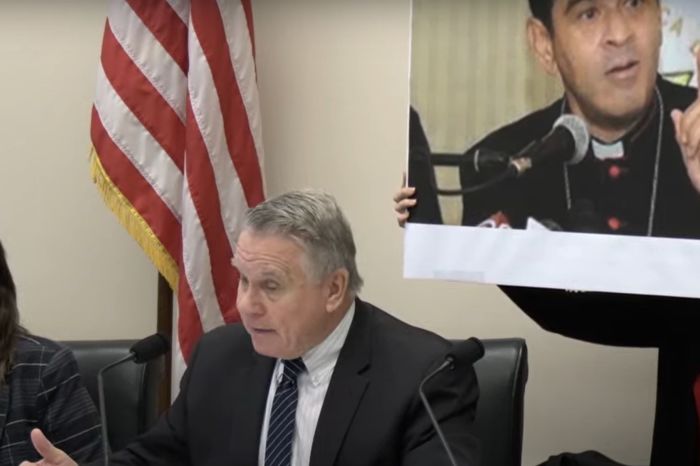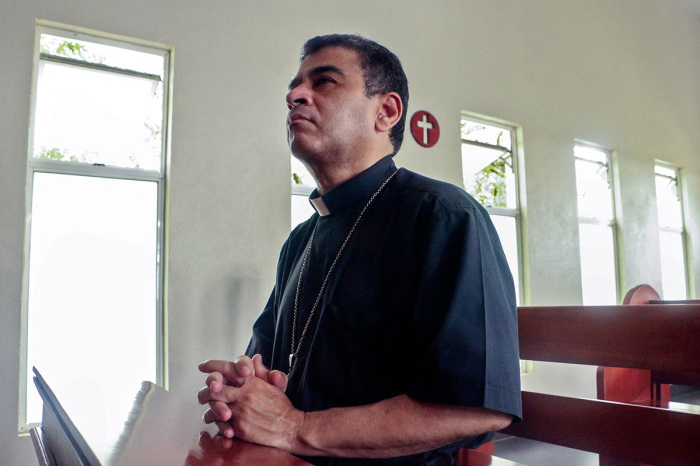Exiled Catholics testify about their imprisonment under Nicaragua's Ortega dictatorship

An exiled prisoner of conscience from Nicaragua told members of U.S. Congress he was arrested without a warrant, stripped naked and subjected to multiple interrogations about Bishop Rolando Álvarez, who was sentenced to over 20 years in prison for sermons criticizing the government's human rights violations.
The unnamed witness was one of two exiled prisoners of conscience to offer their testimonies for Thursday's U.S. House of Representatives Foreign Affairs Subcommittee on Global Health, Global Human Rights and International Organizations hearing.
With the hearing titled "An Urgent Appeal to Let Bishop Álvarez Go," witnesses called on President Daniel Ortega to release him.
Both of the witnesses are members of the Catholic Church currently living in exile due to criminal convictions by the regime. They shared their stories to help advocate for the bishop's release. Their names were concealed for safety reasons.
In February, a court sentenced the bishop to 26 years in prison and issued a fine of almost $5,000. Álvarez was stripped of his citizenship and found guilty of "undermining national integrity" and "propagation of false news." He was also found guilty of "aggravated obstruction of functions" and "disobedience of contempt for authority."
According to the witness referred to as Exiled Prisoner of Conscience #2, the injustices against people of faith worsened in April 2018 after armed paramilitary groups and police violently shut down a demonstration of young people protesting the government's social security reforms.
Álvarez and some of his clergy defended the protestors, according to the witness, who recalled that the churches served as a refuge for young people "feeling repression" from police and ruling party members.

The witness said he was kidnapped by the National Police of Nicaragua, who did not present an arrest warrant before transferring him to Auxilio Judicial de Managua jail. Once there, the exiled prisoner said that he was stripped naked and forced to wear a prison uniform.
"That same day the interrogations began, there were more than 30 interrogations, which could take place at any time of the day, even in the early hours of the morning," the witness said.
"They blackmailed me and threatened the lives of my relatives because they wanted me to declare that the bishop was a member of an organization that wanted to promote a coup d'état against Daniel Ortega and that he received money from the U.S. government and the European Union," he continued.
In February, the unnamed witness said that he and 222 others, most of them political prisoners, members of human rights organizations and priests imprisoned for defending human rights, were exiled from Nicaragua.
The other unnamed witness, referred to as Exiled Prisoner of Conscience #1, testified that he was arrested in the street by two police officers and six members of the security troops. He was later transferred to the El Chipote prison.
While he was imprisoned, the exiled Nicaraguan said he was also interrogated about Álvarez, including how much money he supposedly received from the U.S. government and the European Union. The interrogators also asked what worship leaders discussed during parish meetings and if they used this as an opportunity to badmouth the government.
"I was accused of undermining the dignity of the state and of Nicaragua, of spreading false news," the exiled witness said.
The hearing also featured testimonies from a parent of a prisoner of conscience and Deborah Ullmer, the regional director for Latin America and the Caribbean Programs at the National Democratic Institute.
During her testimony, Ullmer named actions the U.S. Government could take to advance democracy in Nicaragua, such as working with Latin American countries and U.S. allies to advance a democratic reform in the country.
In his opening remarks, Rep. Chris Smith, R-N.J., a senior House Foreign Affairs Committee member, called for Ortega to release Álvarez from prison and allow him to travel to the United States or the Vatican.
He noted that 12 priests last month who had been imprisoned in Nicaragua were sent to the Vatican in exile. Smith questioned why the bishop was not among them.
In early July, the newspaper Divergentes reported that Álvarez met with a representative of the Vatican who tried to persuade him to be exiled to Rome, which he reportedly refused, demanding his unconditional release.
In a statement, Bishop David J. Malloy, chairman of the U.S. Conference of Catholic Bishops' Committee on International Justice and Peace, cited "another breakdown in negotiations."
Smith highlighted a video of Álvarez released by the Nicaraguan government this week. The congressman expressed concern regarding the bishop's apparent weight loss. Smith wondered whether the bishop was fed enough at La Modelo, which the congressman described as "one of Latin America's most notorious prisons."
"The international community can no longer turn a blind eye to what is happening to the people of Nicaragua — including and especially people of faith," Smith said.
"The regime has closed Catholic radio stations and universities, obstructed access to places of worship, banned public Way of the Cross processions, and frozen the bank accounts of hundreds of Catholic institutions," he added.
The lawmaker said prisoners have had their requests for Bibles denied. He pointed to the Nicaraguan government's expulsion of the Missionaries of Charity — an order founded by Mother Teresa — as another religious freedom attack.
In a statement provided Tuesday to The Christian Post by Alliance Defending Freedom International, the legal advocacy group said it filed a petition in September on Álvarez's behalf with the Inter-American Commission on Human Rights. ADF is awaiting a response.
"For simply fulfilling his duties as a bishop and preaching on the teachings of Christ and the Catholic Church, Bishop Álvarez has been unjustly convicted and imprisoned," Kristina Hjelkrem, legal counsel for Latin America for ADF International and the lead lawyer on the bishop's case, said in a statement.
"The U.S. Congress should strongly condemn the Nicaraguan government's actions against Bishop Rolando Alvarez and strongly advocate that Nicaragua comply with its human rights obligations by releasing the bishop from prison and restoring his full rights," she concluded.
Samantha Kamman is a reporter for The Christian Post. She can be reached at: [email protected]. Follow her on Twitter: @Samantha_Kamman




























